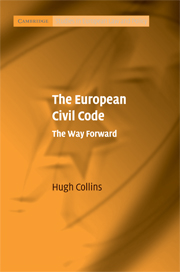Book contents
- Frontmatter
- Contents
- Preface
- Series editors' Preface
- Table of cases
- Table of treaties and legislation
- I Civil society and political union
- II The acquis communautaire in private law
- III The hidden code
- IV Private law and the Economic Constitution
- V Cultural diversity and European identity
- VI Respecting legal diversity
- VII Multi-level private law
- VIII Strengthening convergence
- IX Exploring the European Social Model
- Index
- CAMBRIDGE STUDIES IN EUROPEAN LAW AND POLICY
- References
VII - Multi-level private law
Published online by Cambridge University Press: 26 February 2010
- Frontmatter
- Contents
- Preface
- Series editors' Preface
- Table of cases
- Table of treaties and legislation
- I Civil society and political union
- II The acquis communautaire in private law
- III The hidden code
- IV Private law and the Economic Constitution
- V Cultural diversity and European identity
- VI Respecting legal diversity
- VII Multi-level private law
- VIII Strengthening convergence
- IX Exploring the European Social Model
- Index
- CAMBRIDGE STUDIES IN EUROPEAN LAW AND POLICY
- References
Summary
An impossible necessity?
The European Union is a supranational legal order that can function effectively only in cooperation with national legal systems. Laws enacted within the powers of the European Union, as specified in the intergovernmental treaties, claim supremacy over national laws. Yet the effectiveness of European law depends upon the willingness of national governments and courts to observe its provisions in good faith. When enacted in the form of Directives, even the supranational laws themselves only become fully effective following re-enactment and implementation by national legislatures. The European Union differs sharply in these respects from a complete federal system of government.
In a fully federal structure, a federal legislature would determine the precise content of its laws, with the same rules being applicable throughout the territories. Such a federal system would also comprise a central government, enforcement agencies and federal courts to compel compliance with its legislation. Unlike the European Union, a full federal system of government is with respect to its institutions of government much like a nation state. In contrast, the competence of the European Union is partial, and depends heavily on national governments and institutions to perform its functions and for its effectiveness. Unless the national authorities of the Member States enact the Directives as national laws and the courts insist upon compliance with those laws, the European Union would struggle to render any of its measures effective.
- Type
- Chapter
- Information
- The European Civil CodeThe Way Forward, pp. 182 - 209Publisher: Cambridge University PressPrint publication year: 2008



